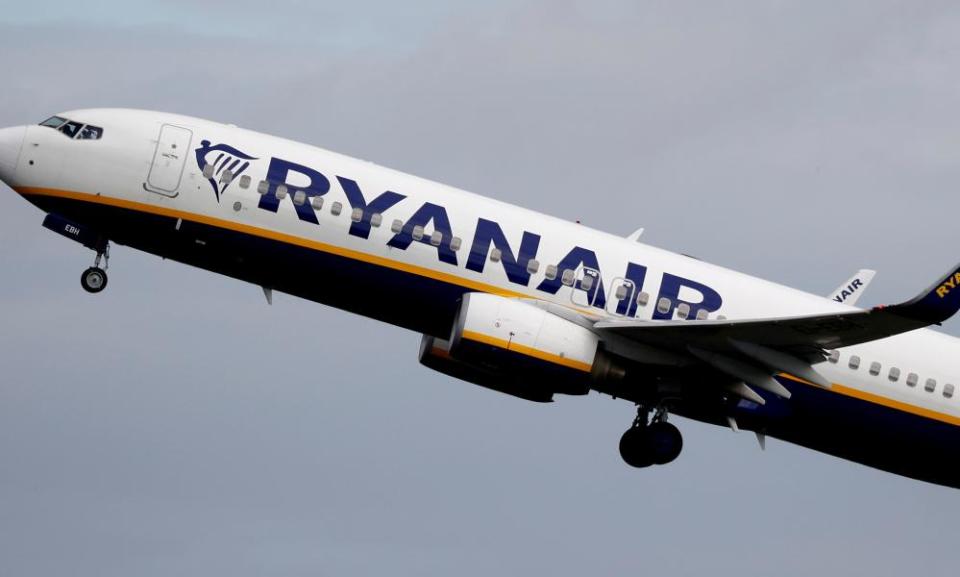Berlin couple test positive for coronavirus after Manchester visit

An urgent track and trace operation is under way in Berlin after a couple tested positive for coronavirus after returning from a holiday to visit friends in Manchester.
Fifty people who have had contact with the couple since their return are in quarantine, of whom 13 have so far tested positive for Covid-19.
The Turkish couple, a 50-year-old taxi driver and his 45-year-old wife, arrived home on a Ryanair flight on 16 July. They were not diagnosed until six days after their return. The whole family is now infected, including the couple’s four children, aged nine to 21, and their grandmother.
Gudrun Widders, an official at the local health office in Berlin’s Spandau district, told the Bild newspaper that no one in the family has required hospital treatment.
She told the Guardian on Tuesday that the health office had made repeated attempts to contact Ryanair so the airline could contact other passengers who were on the plane, but that it has “so far had no feedback”.
Ryanair insisted it had provided the German authorities with the relevant information.
A spokesperson for the Irish airline said: “Ryanair routinely deal with public health authorities’ requests for passenger contact lists in the face of suspected or confirmed Covid-19 cases. We received the request from the health department of the Berlin-Spandau district office on 22 July and Ryanair responded the same day with the appropriate documentation to release the flight manifest under GDPR (general data protection) regulations. The German health authorities only followed up five days later and we supplied the requested passenger details.”
However, one passenger who had been on the same flight contacted the Guardian to express his concern that he had not been contacted by the airline.
“I have had no communication from Ryanair about the possibility of Covid-19 infection onboard,” Anthony Harrison said.
Contact tracing is a vital part of the global airline industry’s plan for recovery, theoretically reducing the risk that an infection onboard a plane can lead to a larger outbreak.
The incident comes at a sensitive time for Ryanair and the broader industry as they try to return travel towards pre-pandemic levels. The dramatic decline in passenger numbers since travel restrictions were first brought in in March has put the industry under severe financial pressure, with Ryanair, easyJet, British Airways and Virgin Atlantic among the airlines cumulatively cutting tens of thousands of jobs.
The International Civil Aviation Organization, the United Nations body that regulates air travel, recommends airlines require passengers fill out a “passenger health locator form” to allow public health authorities to carry out contact tracing.
The Robert Koch Institute, the main body advising the German government on public health, said on Tuesday that air travel itself was not likely to encourage the spread of the disease, despite people being unable to keep the recommended distancing rules. “Modern jets have filter systems in their air conditioning which make them safer than other forms of travel,” the RKI’s president, Lothar Wieler, said. “An aeroplane is in general still a place where the risk of infection is not so very high.”
Ute Rexroth, an epidemiologist at the RKI, said the institute had vigorously sought to track and trace air travellers thought to have been at risk of contracting the disease at the start of the pandemic, but that the process had proved to be “incredibly difficult – not least getting data from the airlines themselves. It’s just a huge amount of effort.”
In a separate development, Germany’s foreign ministry advised holidaymakers on Tuesday not to travel to several Spanish regions, including Catalonia, where coronavirus infection rates have risen. “We currently advise against unnecessary tourist trips to the autonomous communities of Aragon, Catalonia and Navarre due to high infection numbers and local lockdowns,” the ministry said on its website.
From Wednesday, Berlin airports will be offering free tests to people arriving in the city. On Monday, the state of Bavaria spearheaded the mass rollout of coronavirus testing facilities in the hope of reaching as many returning holidaymakers as possible. There is political consensus in Germany that obligatory testing makes sense amid a surge in the number of cases of the virus both at home and abroad.
In the past eight days the German capital has reported 234 new coronavirus cases.

 Yahoo Movies
Yahoo Movies 